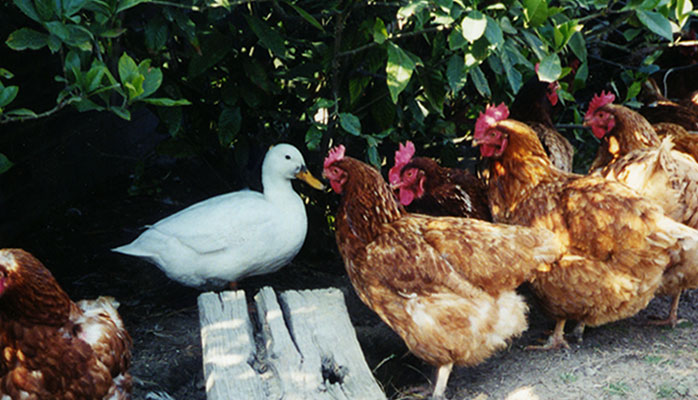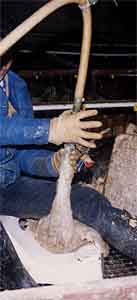Ducks and Geese
Pier 1 Drops Feathers from Pillows
In January 2005, United Poultry Concerns joined the animal rights group Viva!USA in urging Pier 1 Imports to stop selling pillows and comforters filled with duck feathers. In March 2006, Pier 1 agreed, stating:
“Pier 1 has already made a strategic business decision to carry only fiber-filled pillows, and therefore will no longer carry feather-filled pillows in the future.”
In fact, it was the animal advocacy community that convinced Pier 1 to drop the pillow feathers. Feathers used in pillows and comforters come from ducks raised in filthy factory-farm sheds, who are possibly live plucked, and then brutally slaughtered. UPC thanked Pier 1 for doing the right thing, and you may, too, by contacting:
Pier 1 Imports
301 Commerce Street
Fort Worth, TX 76102
800-245-4595
www.pier1.com/company/customerrelations.asp

UPC Sanctuary
Israel Rules Force-Feeding Must End
In August 2003, the Israeli High Court of Justice ruled that the force-feeding of geese with long metal tubes violates the country’s animal protection law. In March 2005, the court criticized the Ministry of Agriculture for delaying compliance and ruled that the practice must end. When that didn’t happen, the court criticized the state for failing to do its law enforcement duty and stipulated that the force feeding of geese had to end by mid-April of 2006, and that all 57,000 geese force fed to produce foie gras must be slaughtered.
Chicago Bans Foie Gras Sale

On April 26, 2006, the Chicago City Council passed an ordinance prohibiting the sale of foie gras, a “gourmet” product made from the diseased livers of force-fed ducks and geese. Authored by Chicago Alderman Joe Moore, the bill to ban the sale of foie gras won the unanimous support of the Chicago City Council on Health and was endorsed by Chicago chefs. The Illinois state legislature has a similar bill pending, and California’s ban on the production and sale of foie gras is scheduled to go into effect in 2012. Activists are now gathering signatures in Philadelphia to ban the product there.
Meanwhile, foie gras producers are poised to fight back. A May 3 article in The New York Times (Marian Burros, “Organizing for an Indelicate Fight”) said that Sonoma Foie Gras in California has filed a lawsuit against the natural-food grocery chain Whole Foods, charging the company with “intentional interference with contract” for telling Grimaud Farms, which sells duck meat to Whole Foods, to stop slaughtering and distributing Sonoma’s force-fed ducks or lose Whole Foods’ business. Despite selling duck meat, Whole Foods has a written policy not to sell foie gras, “because of the cruelty.” On May 1, Hudson Valley Foie Gras (NY), Sonoma Foie Gras, Rougie (Canada) and D’Artagnan formed the North American Foie Gras Producers Association. They’ve hired a PR and lobbying group to examine the constitutionality of laws banning foie gras production or sale.